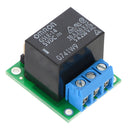Pololu Basic SPDT Relay Carrier with 5VDC Relay (Assembled)
by Pololu





The Pololu basic relay carrier modules allow simple control of a single-pole, double-throw (SPDT) switch from low-voltage, low-current control signals.
This item includes the basic carrier PCB with a soldered-in 5 V relay, 5.0 mm terminal blocks for the switch connections, and straight 0.1" male header for the control connections. The included power relay is an Omron G5LE-14-DC5 and is rated for up to 10 A under most conditions.
The carrier board routes the three relay control pins to 0.1″-spaced pins compatible with standard solderless breadboads and female servo cable connectors.
Using the relay module
The switch portion of the relay is accessible on one side of the board while the control pins are routed to the other. The relay coil is powered by supplying the appropriate coil voltage for your specific relay across the VDD and GND pins, and it is activated by a digital high control signal on the EN pin. The control signal is fed directly to a BSS138 N-channel MOSFET, which in turn actuates the relay coil when the control voltage exceeds approximately 2.5 V, up to a maximum of 20 V (see BSS138 datasheet (92k pdf) for details).
The relay switch terminals COM (common), NO (normally open), and NC (normally closed) are routed on the PCB with a minimum clearance of 60 mils (1.5 mm) from other copper. The copper traces are designed to be at least 45 mil (1.1 mm) from the board edges, though manufacturing variations in the board edges can make those distances slightly lower.
In most applications, the current and voltage ratings for the module will match the ratings of the relay used. Maximum current, maximum voltage, and life expectancy are interdependent; we therefore recommend careful examination of your relay’s datasheet.
Warning: This product is not designed to or certified for any particular high-voltage safety standard. Working with voltages above 30 V can be extremely dangerous and should only be attempted by qualified individuals with appropriate equipment and protective gear.
Resources
- Pololu basic SPDT relay carrier schematic diagram (131k pdf)
- Omron G5LE single-pole 10A power relay datasheet (1MB pdf)
- BSS138 N-channel MOSFET datasheet (92k pdf)
- Basic SPDT Relay Carrier for “Sugar Cube” Relays drill guide (33k dxf)This DXF drawing shows the locations of all of the board’s holes.
- 3D model of the Pololu Basic SPDT Relay Carrier with DC Relay (3MB step)
We no longer stock this product
It's sad to say goodbye but sometimes we have to retire products to make way for new things.
You may still be able to buy this product directly from our friends at Pololu - check out their website!
Shop with confidence – we've been serving the hobbyist electronics, Maker, and retro gaming communities since 2012.
- Satisfaction or refund guarantee
- Worldwide shipping via mail or courier
- 57,000+ customer reviews
- Secure website and payments